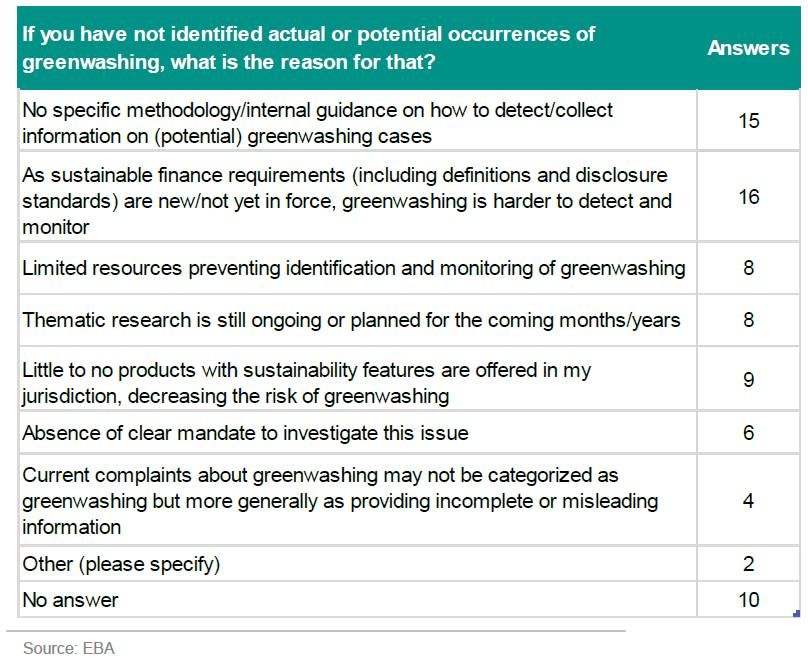Alleged cases of greenwashing have been rising in the EU banking sector

The EBA published its first report on the monitoring and supervision of greenwashing. According to the numbers, alleged cases of greenwashing have been increasing since 2012. The above-mentioned trend also holds for the EU banking sector. Climate change is the most common topic subject to greenwashing claims in the EU financial sector. However, supervisors do not confirm the alleged cases. They indicate that the lack of a methodology to identify greenwashing cases deters them from reporting such claims.
The EBA published its first report on the monitoring and supervision of greenwashing, as requested by the European Commission
According to the numbers, alleged cases of greenwashing have been increasing since 2012
The above-mentioned trend also holds for the EU banking sector
Climate change is the most common topic subject to greenwashing claims in the EU financial sector
However, supervisors do not confirm the alleged cases. They indicate that the lack of a methodology to identify greenwashing cases deters them from reporting such claims
EBA did not issue any recommendations, explaining that more data is needed
The European Banking Authority (EBA) has recently published the Progress Report on Greenwashing Monitoring and Supervision (see ). This followed a request from the European Commission to all supervisory authorities issued in May 2022, with the final report being due in June 2024. The current report stands as a stock-take of the current situation in the EU banking sector and does not include any policy recommendations.
According to the European Supervisory Authorities (ESAs), greenwashing stands for ‘a practice whereby sustainability-related statements, declarations, actions, or communications do not clearly and fairly reflect the underlying sustainability profile of an entity, a financial product, or financial services. This practice may be misleading to consumers, investors, or other market participants’.
Alleged cases of greenwashing have been rising since 2012
The report makes use of data compiled by RepRisk, which gathers information on “risk incidents” of companies associated with misleading communication around ESG issues, and captures alleged cases of greenwashing reported in public sources. Still, RepRisk does not verify or validate reported allegations – just checks and reviews the classification of sources. Overall, alleged greenwashing cases have increased globally by more than six times since 2012. Environmental and social issues are the most prominent topics subject to greenwashing. From the environmental cases, 30% are related to climate change, becoming the second most prominent item subject to greenwashing by companies.
Alleged cases of greenwashing have also been occurring across all economic sectors. However, these are most prominent in six sectors: oil, gas and utilities, mining, industrial construction, food and beverage, household goods and the financial sector. The latter accounted for almost 16% of alleged greenwashing cases registered worldwide in 2022.
Alleged cases of greenwashing in the EU banking sector mirror the overall trend.
Parallel to the global trend, greenwashing trends in the EU banking sector have been increasing since 2012. In 2022, a total of 206 cases were registered, while in 2018 this number equalled 40. Furthermore, the EU financial sector represented 23% of the total alleged greenwashing cases involving an EU company. Not surprisingly, climate change is also the most common topic subject to greenwashing claims in the EU financial sector, including EU banks.
The reasons for this increase remain unclear. While the number of incidents might have increased, the rising demand for green products and the focus given to the topic have also considerably raised the public’s attention to the subject and to EU banks, in particular. Investors increasingly ask for more accountability in the achievement of sustainability objectives.
Attention to the greenwashing risks have increased globally, but especially in Europe. Reasons for this might be related to the i) increasing legal frameworks that have been developed in the EU, and ii) to the wider public scrutiny that EU companies are subject to.
Concerning the EU banking sector, there are two types of greenwashing that may occur. The first regards greenwashing at the product, service and financial instrument level, and the second, at the entity level. An example of the former regards green retail loans and mortgages that are not used to finance goods, products, activities or properties which qualify as (fully) green.
Supervisory authorities do not confirm the rise in alleged cases
The rise in alleged cases of greenwashing as compiled by RepRisk do not match those identified by the competent authorities. In fact, of the authorities surveyed by the EBA, eight have identified ten or less occurrences of actual or potential greenwashing, and 22 have found none.

From the reasons mentioned to justify the mis-identification of occurrences, two are more prominent. First, the supervisory authorities lack a specific methodology/internal guidance on how to detect/collect information on (potential) greenwashing cases. And second, as sustainable finance requirements (including definitions and disclosure standards) are new/not in force yet, greenwashing is harder to detect and monitor. For these reasons, greenwashing cases in the EU banking sector are mostly identified and reported by external stakeholders, such as NGOs, consumer protection associations and press investigations.

The alleged cases of greenwashing identified by those external stakeholders indicate that it is most likely to happen at the entity level, rather than at the product level. For instance, when a bank positions itself externally (through advertising, social media, sustainability reports) as being sustainability-oriented but still engages with companies that are not considered or perceived as being sustainable. It might also be the case that greenwashing at the entity level is easier to identify for NGOs, given that greenwashing at the product level might require access to private data, not easily available to the public in general. Finally, the EBA excludes itself from issuing any recommendations concerning legal frameworks because it considers that more data is needed to complete its analysis.
This article is part of the SustainaWeekly of 12 June 2023
